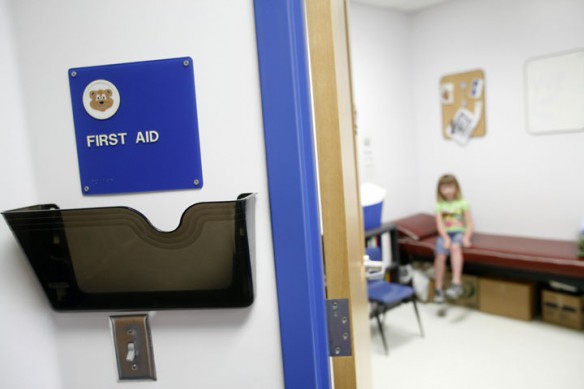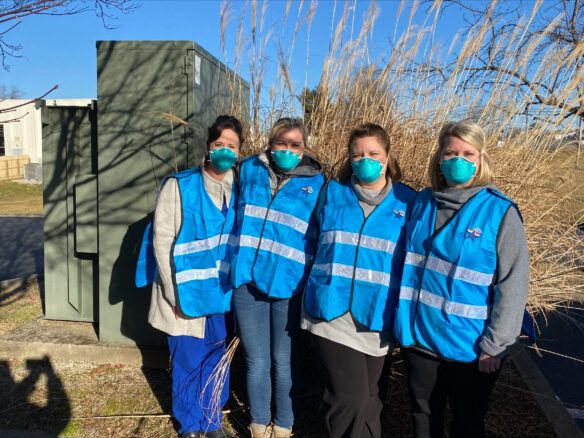
File photo, Kentucky Department of Education
On any given day in Mercer County schools, Amanda Payton can provide school and sports physicals, make visits to sick students and provide timely medical interventions for staff.
As the district’s health coordinator and now an advanced practice registered nurse (APRN), Payton can offer these services on the spot and free of charge, reducing health-related disruptions on students’ academic progress.“Parents have been able to stay at work while we care for their child, and the child is able to stay in school,” Payton said. “This allows students to be seen quicker than with an outside source, and have a quicker transition back into the classroom.”
These kinds of services were not always provided in Mercer County. It wasn’t until after the district received support through Elementary and Secondary School Emergency Relief (ESSER) funding from the federal American Rescue Plan Act that it was able to hire Payton as the district’s APRN and expand its health services.
The federal funding supports the safe and sustained return to in-person learning after the COVID-19 pandemic, and is meant to help students who need it most, particularly those most impacted by the global health event.
Expanding the district’s health services was a top priority, said Superintendent Jason Booher.
“Investing ESSER funds into health services demonstrates Mercer County’s commitment to prioritizing student’s well-being and creating an environment conductive to learning,” he said. “By using these funds, we are able to minimize the loss of instruction time for students and provide them with additional support they may not typically receive.”
This strategic allocation of funds has not only allowed the district to minimize instructional disruptions, but also has promoted the overall well-being of students and staff and targeted underserved students who have limited healthcare resources.
Students having access to medical care at school also could provide long-term benefits, such as preventing the development of long-lasting health issues that could hinder student’s academic progress.
“I can help students set up long-term appointments with physicians in cases of chronic illness,” Payton said.
Booher said Mercer County is taking important steps to support students and promote overall success.
One of the district’s goals had been to hire an APRN that could make health services assessable for staff and students while on school campuses.

Mercer County health coordinator and advanced practice registered nurse (second from left) is photographed with three other district nurses. From left to right: Christy Ransdell; Payton; Kim Ellis and Dana Warren. (Submitted photo)
Payton started working with Mercer County schools when she was hired as the district’s health coordinator in 2017. In that role, she oversees health policies and procedures, and the budget, and collaborates with the county health department.
When Payton obtained her degree at Walden University to become an APRN in 2020, the district saw the perfect opportunity to fill their APRN position.
Payton said that it was “always her goal to eventually become a nurse practitioner.” Now she can be more involved with student health and “be able to help the kids.”
Payton can also offer acute services for students and staff, physicals for employees who drive school vehicles, and new employee physicals, such as TB and drug screening.
“Our school-based health clinic’s purpose is to provide preventive and acute care, as well as health education for our students and staff,” said Payton.
After Payton was hired as the district’s APRN, other ESSER money was focused on increasing the supply of medical equipment within the district.
An electronic health record system was purchased for Payton and the team of nurses, who had previously been hired before the pandemic, to manage the medical records of students and staff. This also has made it more convenient for parents to consent to their child’s treatment.
Payton currently has a total of 179 reviews in the patient management system used by the district, with an average rating of five out of five stars.
“Amanda is always so easy to work with and efficient! So thankful that our school offers this service and that she is in this position,” said a patient of Payton’s. “She is a busy lady, and I see her jumping from school to school when she’s called upon, but still always manages to work us in!”
Payton credits the ESSER funding for allowing the district to increase the accessibility of healthcare and maintain learning for students.
“There has always been talk of expanding health services before COVID hit, but the pandemic and ESSER funding helped those ideas take off into action” she said.




Leave A Comment